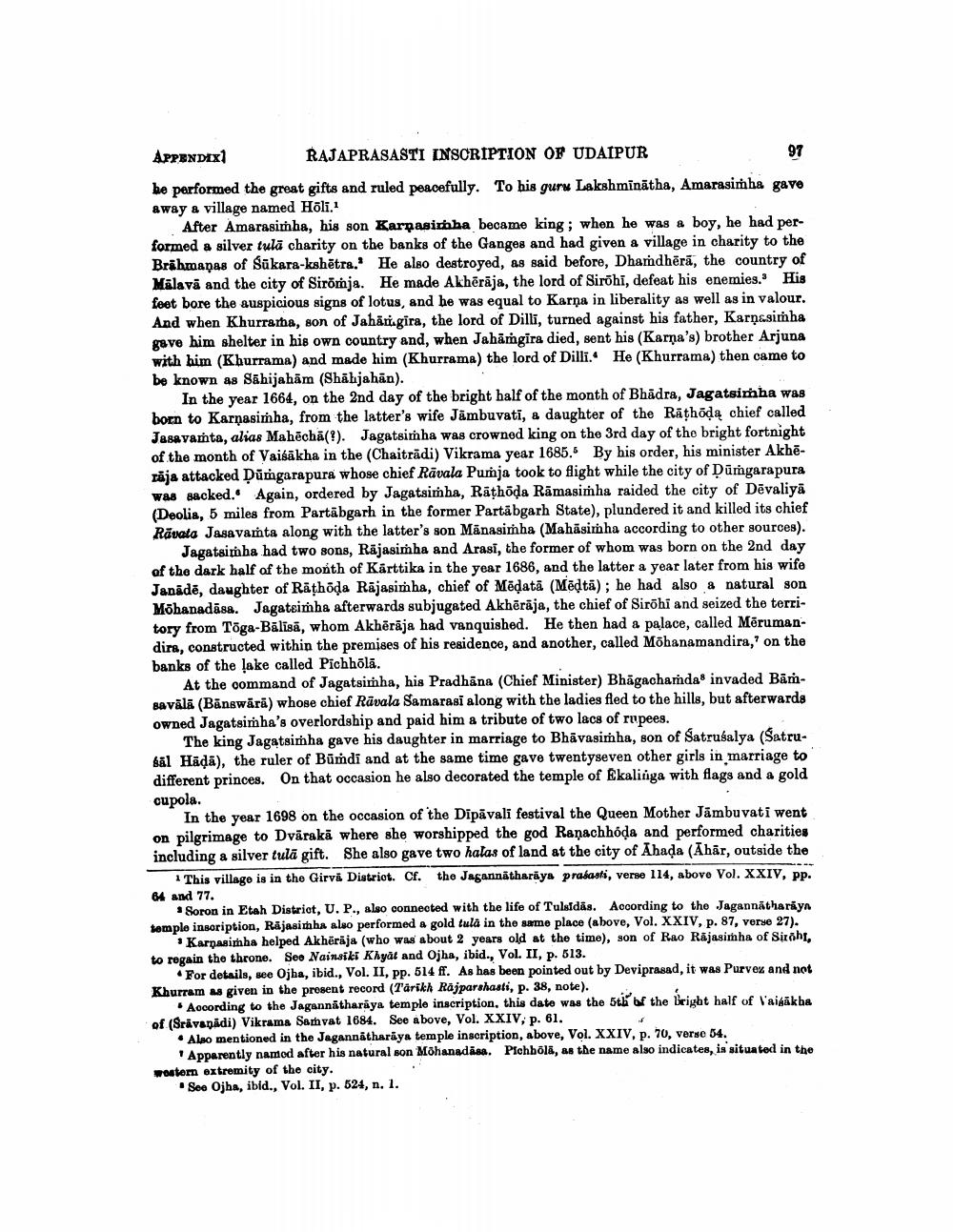________________
97
APPENDIX)
RAJAPRASASTI INSCRIPTION OF UDAIPUR be performed the great gifts and ruled peacefully. To his guru Lakshminātha, Amarasimha gave away a village named Hõli.
After Amarasimha, his son Karpasimba became king: when he was a boy, he had performed a silver tulā charity on the banks of the Ganges and had given a village in charity to the Brahmanas of Sūkara-kshētra.' He also destroyed, as said before, Dhamdhērā, the country of Mälava and the city of Sirorja. He made Akhērāja, the lord of Sirohi, defeat his enemies. His feet bore the auspicious signs of lotus, and he was equal to Karna in liberality as well as in valour. And when Khurramba, son of Jahan.gira, the lord of Dilli, turned against his father, Karnesimha gave him shelter in his own country and, when Jahāṁgira died, sent his (Karna's) brother Arjuna with him (Khurrama) and made him (Khurrama) the lord of Dilli. He (Khurrama) then came to be known as Sāhijahām (Shahjahan).
In the year 1664, on the 2nd day of the bright half of the month of Bhadra, Jagatsimha was born to Karnasimha, from the latter's wife Jämbuvati, a daughter of the Rathodą chief called Jasa vamta, alias Mahēchä(?). Jagatsimha was crowned king on the 3rd day of the bright fortnight of the month of Vaišākha in the (Chaiträdi) Vikrama year 1685. By his order, his minister Akhērája attacked Dumgarapura whose chief Rävala Purja took to flight while the city of Dūmgarapura was sacked. Again, ordered by Jagatsimba, Rāthoda Rāmasimha raided the city of Dēvaliyā (Deolia, 5 miles from Partabgarh in the former Partabgarh State), plundered it and killed its chief Rävata Jasa vamta along with the latter's son Mānasimha (Mahāsimha according to other sources).
Jagatsimha had two sons, Rājasimha and Arasī, the former of whom was born on the 2nd day of the dark half of the month of Karttika in the year 1686, and the latter a year later from his wife Janādē, daughter of Räthöda Rājasimha, chief of Mēdata (Mēdtā); he had also & natural son Möbanadāsa. Jagatsimha afterwards subjugated Akhēraja, the chief of Sirohi and seized the territory from Töga-Bālīsā, whom Akhērāja had vanquished. He then had a palace, called Mērumandira, constructed within the premises of his residence, and another, called Mohanamandira,' on the banks of the lake called Pichhölā.
At the command of Jagatsimha, his Pradhana (Chief Minister) Bhägachamda invaded Bāmsavāla (Băngwārā) whose chief Rävala Samarasi along with the ladies fled to the hills, but afterwards owned Jagatsimha's overlordship and paid him a tribute of two lacs of rupees.
The king Jagatsimha gave his daughter in marriage to Bhāvasimha, son of Satrusalya (Satrusal Hadā), the ruler of Bumdi and at the same time gave twentyseven other girls in marriage to different princes. On that occasion he also decorated the temple of Ekalinga with flags and a gold cupola.
In the year 1698 on the occasion of the Dipāvali festival the Queen Mother Jämbuvati went on pilgrimage to Dvārakā where she worshipped the god Ranachhóda and performed charities including a silver tulā gift. She also gave two halas of land at the city of Ahada (Ahār, outside the
1 This village is in the Girva District. Cf. the Jagannatharaya prasasti, verse 114, above Vol. XXIV, pp. 64 and 77.
* Soron in Etah District, U.P., also connected with the life of Tulsidas. According to the Jagannatharaya temple insoription, Rajasimha also performed a gold tulă in the same place (above, Vol. XXIV, p. 87, verse 27).
* Karpasimha helped Akhērāja (who was about 2 years old at the time), son of Rao Rajasimha of Siroht, to regain the throne. See Nainsiki Khyāt and Ojha, ibid., Vol. II, p. 513.
For details, see Ojha, ibid., Vol. II, pp. 514 ff. As has been pointed out by Deviprasad, it was Purvex and not Khurram as given in the prosent record (Tarikh Rajparshasti, p. 38, note).
According to the Jagannatharaya temple inscription, this date was the 5th of the Bright half of Waikikha of (Srävanidi) Vikrama Samvat 1684. See above, Vol. XXIV, p. 61.
- • Also mentioned in the Jagannatharaya temple inscription, above, Vol. XXIV, p. 70, verse 04.
Apparently named after his natural son Möhanadāsa. Pichbola, as the name also indicates, is situated in the wostem extremity of the city.
See Ojha, ibid., Vol. II, p. 524, n. 1.




